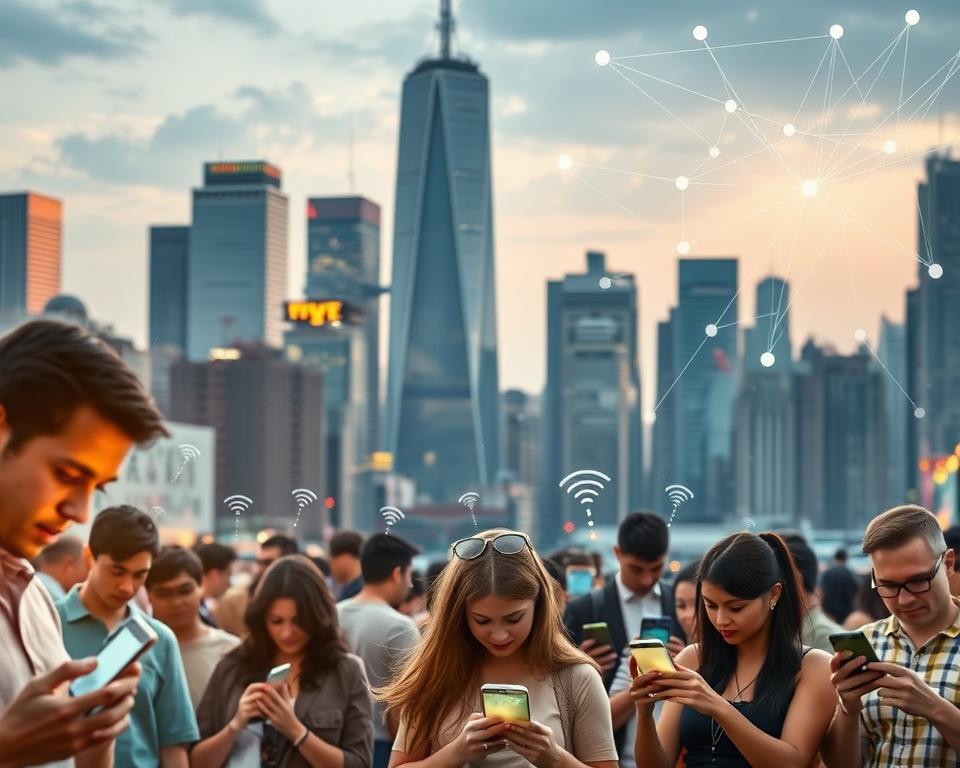
Discover the Best Uses of Mobile Technology
Did you know that as of 2023, over 5 billion people worldwide are using mobile devices, which translates to nearly 65% of the global population? This staggering statistic highlights the incredible impact and significance of mobile technology in our day-to-day lives. With such expansive smartphone penetration, the best uses of mobile technology are more critical now than ever, transforming the way we communicate, work, and engage with our surroundings. Mobile technology applications have not only made our lives more efficient but also fostered seamless connections across distant locations.
In this article, we will explore the various facets of mobile technology, providing insights into the essential applications and benefits that enhance our quality of life. Understanding these elements lays a strong foundation for grasping how mobile technology shapes our modern world.

Key Takeaways
- Mobile technology usage statistics emphasize its global impact.
- Smartphones are transforming communication and business operations.
- Mobile technology applications enhance daily life and efficiency.
- Understanding mobile technology benefits is crucial for leveraging it effectively.
- Exploring different mobile technologies opens up new possibilities.
Introduction to Mobile Technology
Mobile technology has dramatically evolved over the years, transitioning from the early days of basic mobile phones to today’s powerful smartphones that serve numerous functions. These devices have integrated sensors for various applications, offering features that range from simple communication to advanced capabilities like augmented reality and artificial intelligence.
Connectivity options such as 4G and the anticipated rise of 5G provide users with unmatched speed and reliability. Major operating systems like iOS and Android support a vast array of applications, catering to nearly every aspect of daily life. The surge in smartphone ownership highlights the pervasive influence of mobile technology in modern society, with over 75% of Americans owning smartphones as of 2023.
This burgeoning prevalence not only facilitates communication and data exchange globally but also shapes mobile technology trends that enhance user experience and functionality. The exploration of these trends will uncover the numerous best uses of mobile technology in upcoming sections.

Best Uses of Mobile Technology
The impact of mobile technology extends beyond simple communication. Various applications significantly enhance both personal interactions and professional environments. Exploring the best uses of mobile technology reveals how it facilitates seamless communication and streamlines business operations.
Enhancing Communication
Mobile technology plays a crucial role in enhancing communication methods. Platforms like WhatsApp and Zoom enable individuals and teams to connect instantly, fostering stronger personal and professional relationships. Video calls and instant messaging have made communication more direct and efficient, allowing for real-time dialogue regardless of geographical barriers. The mobile technology benefits include improved accessibility and heightened collaboration, enriching our daily interactions.
Streamlining Business Operations
In the realm of business, mobile technology serves as a backbone for increased productivity. Tools like project management applications and mobile customer relationship management (CRM) systems empower teams to manage tasks and track customer interactions on-the-go. This flexibility promotes remote work culture and encourages real-time collaboration among employees, yielding many mobile technology benefits for organizations. Enhanced efficiency leads to better performance and an elevated competitive edge in the market.

Mobile Technology Trends in 2023
As we move through 2023, mobile technology continues to evolve at a rapid pace, shaping how we connect and interact with the world. Two prominent trends stand out this year: the rise of 5G connectivity and the integration of AI and machine learning. These advancements are not only enhancing user experiences but also transforming entire industries.
Rise of 5G Connectivity
The rollout of 5G networks represents a significant leap in mobile technology trends. This next-generation mobile network offers faster download and upload speeds, lower latency, and improved connectivity. Various sectors, including telemedicine and internet-connected devices, are already reaping the benefits. For instance, healthcare providers utilize 5G to deliver real-time remote consultations, expanding access to medical care for patients in remote areas.
Integration of AI and Machine Learning
Mobile technology innovations now heavily incorporate artificial intelligence and machine learning. This integration enables personalized user experiences, allowing apps to learn from user behaviors, preferences, and patterns. Predictive analytics results in timely recommendations, enhancing service offerings while keeping users engaged. Businesses leverage these technologies to streamline operations, anticipating customer needs with remarkable accuracy.

Innovative Mobile Technology Applications
Mobile technology applications are transforming various aspects of daily life, driving efficiency and enhancing user experiences. In health, finance, and personal management, these innovations reveal the potential of mobile technology to improve daily tasks.
Mobile Health Monitoring
Mobile health monitoring has revolutionized how individuals track their health metrics. Applications like MyFitnessPal and devices such as Fitbit allow users to monitor activities, nutrition, and vital signs conveniently. This shift toward mobile health monitoring empowers users to take control of their health, and tailor wellness plans to their specific needs.
Smart Personal Assistants
Smart personal assistants like Siri and Google Assistant exemplify the ease that mobile technology applications bring to daily tasks. Voice commands facilitate everything from setting reminders to controlling smart home devices. This functionality streamlines operations, enabling users to manage their time and activities more effectively.
Mobile Payment Solutions
The adoption of mobile payment solutions such as Apple Pay and Venmo demonstrates a significant shift towards cashless transactions. These platforms streamline the payment process and ensure secure transactions. With enhanced security features, mobile payment solutions cater to modern consumers who prioritize convenience.

Mobile Technology Benefits for Businesses
Mobile technology offers remarkable advantages for businesses, transforming everyday operations and enhancing customer experiences. By harnessing mobile technology solutions, companies can significantly boost workplace productivity and strengthen customer relationships.
Increased Productivity
One of the key mobile technology benefits is the ability to improve productivity among employees. Mobile apps designed for project management enable teams to coordinate tasks seamlessly, regardless of location. Tools like Slack and Trello facilitate real-time communication and collaboration, which is essential for remote work environments. With enhanced connectivity, employees can manage projects more efficiently and stay on track.
Improved Customer Engagement
Engaging with customers becomes easier through mobile technology. Businesses can use applications and social media platforms to interact in real-time, guiding customer support and providing updates on products or services. Personalized marketing strategies created through mobile technology solutions allow companies to tailor their messages based on user behavior, leading to heightened customer satisfaction and loyalty.
| Benefit | Description | Example |
|---|---|---|
| Increased Productivity | Enhances team collaboration and project management | Using Slack for communication |
| Improved Customer Engagement | Real-time interaction with customers for better support | Personalized offers via mobile apps |
Mobile Technology Innovations Shaping the Future
The landscape of mobile technology is evolving rapidly, with innovations fundamentally altering how users interact with their devices. One significant trend involves the integration of augmented reality (AR) and virtual reality (VR) in various applications, which enhances user experiences in gaming, retail, and education. These mobile technology innovations create immersive environments that engage users on a new level.
Another area experiencing notable advancements is mobile security. Technologies such as biometric authentication—including facial recognition and fingerprint scanning—are increasingly utilized to ensure that user data remains protected. Alongside this, end-to-end encryption provides an extra layer of security, addressing privacy concerns that have become paramount in today’s digital world. The enhancement of these security measures helps build trust among users, encouraging them to adopt mobile technology advancements confidently.
- Augmented Reality (AR) – Revolutionizing customer engagement in retail.
- Virtual Reality (VR) – Transforming the gaming experience with immersive reality.
- Biometric Security – Offering secure access through unique physical attributes.
- End-to-End Encryption – Ensuring user data confidentiality and integrity.
As mobile technology continues to innovate, it is essential to recognize how these advancements are reshaping industries and influencing the daily lives of consumers. The potential for further development holds exciting possibilities that promise to enhance connectivity, security, and user experience across all sectors.
Mobile Technology Solutions for Everyday Life
Mobile technology solutions have become integral to enhancing everyday experiences, transforming how individuals interact with the world. With innovations evolving rapidly, mobile technology applications continue to optimize various aspects of life, making activities more engaging and efficient.
Augmented Reality Experiences
Augmented reality (AR) has revolutionized the way consumers approach shopping, travel, and entertainment. Users can visualize products in their own space or explore destinations through interactive experiences. Apps like IKEA Place allow customers to see how furniture would fit in their homes before making a purchase. This technology not only improves the shopping experience but also bridges the gap between physical and digital realms.
Remote Work Collaboration Tools
The rise of remote work has amplified the need for effective collaboration tools. Applications such as Slack and Microsoft Teams facilitate seamless communication among team members, fostering a dynamic and productive workspace. These mobile technology applications enable file sharing, video conferencing, and project management, allowing teams to stay connected regardless of their physical location. As a result, organizations can maintain high levels of productivity while adapting to flexible work arrangements.
Mobile Technology Advancements in Education
Mobile technology advancements are reshaping the educational landscape by providing innovative ways to learn. Educational apps designed for various subjects offer interactive and engaging content that caters to different learning styles. Students can access e-learning platforms directly from their smartphones, allowing for flexibility in their study schedules and environments.
Virtual classrooms have transformed traditional teaching methods. With video conferencing tools, educators can conduct interactive lessons, ensuring that students participate actively, no matter where they are located. Utilizing features such as gamification makes learning more appealing, motivating students to engage with the material in a fun and dynamic way.
Furthermore, mobile technology applications play a crucial role in assessments. Real-time feedback systems enable educators to track student progress easily. This data-driven approach allows for personalized learning experiences, ensuring that each student receives the assistance they need to succeed.
Overall, the integration of mobile technology in education enhances accessibility and fosters a more inclusive learning environment. By embracing these advancements, educators and students can work together to realize the full potential of modern educational practices.
Mobile Technology Integration in Smart Homes
The emergence of mobile technology integration within smart homes revolutionizes how we manage our living spaces. With the introduction of automated home systems, homeowners gain unprecedented control over various aspects of their environment. These innovations highlight the benefits of mobile technology solutions, enhancing convenience, security, and energy efficiency.
Automated Home Systems
Automated home systems, such as smart thermostats, enable users to adjust their home environment from anywhere using a smartphone. One prominent example is the Nest thermostat, which learns homeowner preferences and automatically adjusts heating and cooling accordingly. This type of mobile technology integration allows for not only comfort but also significant energy savings over time.
Many homeowners appreciate the ability to manage lighting, security systems, and climate controls remotely. For instance, smart lighting systems can be programmed to turn on or off at specified times, creating a welcoming atmosphere while enhancing security. When integrated with motion sensors, these systems can alert homeowners to unexpected activity. This adds a layer of safety, demonstrating how mobile technology solutions enhance everyday living.
| Feature | Traditional Systems | Automated Systems |
|---|---|---|
| Control Method | Manual switches or timers | Remote control via smartphone |
| Energy Efficiency | Fixed settings | Adaptive learning and scheduling |
| Security | Basic locks and alarms | Real-time alerts and monitoring |
Overall, the integration of mobile technology into smart homes not only enhances comfort but also marks a significant shift toward more sustainable and secure living environments. The fusion of technology and daily routines establishes a new benchmark for home automation.
Mobile Technology Optimization Strategies
Optimization plays a crucial role in enhancing the performance of mobile applications. Effective mobile technology optimization strategies can lead to improved user experiences and higher satisfaction rates. Companies must embrace various techniques to ensure that their apps operate efficiently and reliably.
App Performance Improvement
Regular updates are essential for maintaining app performance. Updates not only fix bugs but also introduce new features that can enhance functionality. Efficient coding practices should be prioritized to minimize resource consumption. This includes using optimized algorithms and reducing code complexity.
Integrating user feedback fosters continuous improvement in mobile technology solutions. By actively responding to user suggestions, developers can identify pain points and address them promptly, resulting in a more intuitive user interface.
Another vital aspect of mobile technology optimization is enhancing battery life, loading times, and overall usability. Users appreciate applications that load quickly and consume less battery power. Implementing strategies such as lazy loading and reducing image sizes can significantly enhance app efficiency.
Challenges in Mobile Technology Usage
The rapid adoption of mobile technology integration presents significant benefits while also introducing various challenges. Among these, security concerns stand out as the most pressing issues that users face today. With a wealth of personal information stored on mobile devices, the risk of data breaches, malware attacks, and privacy violations grows exponentially. To ensure safety, users must remain vigilant.
Security Concerns
Data breaches can result in devastating consequences for both individuals and companies. Malware, often introduced through unsecured apps or links, can infiltrate devices and compromise personal data. Users should prioritize the following security practices to mitigate risks:
- Regularly update applications and operating systems to patch vulnerabilities.
- Use strong, unique passwords to protect accounts.
- Avoid clicking on suspicious links or downloading unintended attachments.
- Enable two-factor authentication when available to add an extra layer of security.
- Be cautious with public Wi-Fi networks that may expose your device to threats.
Case Studies on Successful Mobile Technology Implementation
Various organizations have embraced mobile technology solutions to enhance efficiency and engagement. These case studies illustrate the tangible mobile technology benefits experienced in different sectors.
A leading food delivery service implemented a mobile app that streamlined operations, enabling real-time tracking and order processing. As a result, the company saw a 30% increase in customer satisfaction and a 25% boost in delivery speed.
In the healthcare sector, a hospital utilized mobile technology solutions for patient monitoring and appointments. This initiative not only reduced wait times but also improved patient follow-up adherence by 40%, showcasing significant mobile technology benefits in improving health outcomes.
Retailers have also transformed customer experiences through mobile applications. One major brand launched a personalized shopping app that recommended products based on purchase history, which resulted in a remarkable 50% increase in sales conversions.
| Industry | Challenge | Mobile Technology Solution | Benefits Achieved |
|---|---|---|---|
| Food Delivery | Order Processing Speed | Real-time Tracking App | 30% increase in customer satisfaction |
| Healthcare | Patient Follow-ups | Mobile Patient Monitoring | 40% improvement in adherence |
| Retail | Low Sales Conversions | Personalized Shopping App | 50% increase in sales conversions |
These examples underline how effectively implemented mobile technology solutions can address specific challenges while providing significant mobile technology benefits. Organizations that harness the power of mobile apps distinguish themselves in today’s competitive landscape.
Future Prospects of Mobile Technology
The landscape of mobile technology continues to evolve at a rapid pace, driven by exciting mobile technology trends and mobile technology innovations. Among the most significant advancements is the expansion of 5G networks, which promise to enhance connectivity significantly. This increase in bandwidth will not only lead to faster data speeds but will also support more devices simultaneously, reshaping how we interact with technology.
Artificial intelligence is expected to play a key role in these developments. Mobile applications will increasingly integrate AI capabilities, resulting in smarter functionalities that adapt to user preferences. Enhanced predictive analytics will allow apps to provide personalized experiences, enriching user interactions.
Moreover, augmented reality is on the verge of becoming mainstream, offering unique applications in various fields, including entertainment, education, and retail. This technology will enable consumers to visualize products in real-world settings before making purchases, enhancing the shopping experience.
As mobile technology continues to advance, shifts in consumer behavior will likely emerge. Users will demand more seamless and immersive experiences from their devices. Businesses that can harness these mobile technology innovations will find themselves better positioned in an increasingly competitive landscape.
Conclusion
In conclusion, the best uses of mobile technology have reshaped our lives, enhancing both personal and professional experiences. From improving communication and streamlining business operations to introducing innovative applications like mobile health monitoring and smart personal assistants, mobile technology benefits are abundant. The impact of these advancements is evident across numerous sectors, bridging gaps and connecting us in more meaningful ways.
As we embrace ongoing trends like AI integration and the widespread adoption of 5G connectivity, it’s essential to recognize the transformative potential of mobile technology. By leveraging these advancements, individuals and businesses alike can optimize their productivity, foster better customer engagement, and seamlessly integrate smart solutions into everyday life.
We invite you to explore the myriad mobile technology solutions available today. By doing so, you can unlock the full potential of these tools and enhance your daily routines, making the most out of this technological age. Embrace mobile technology and its benefits to stay ahead in an ever-evolving landscape!



